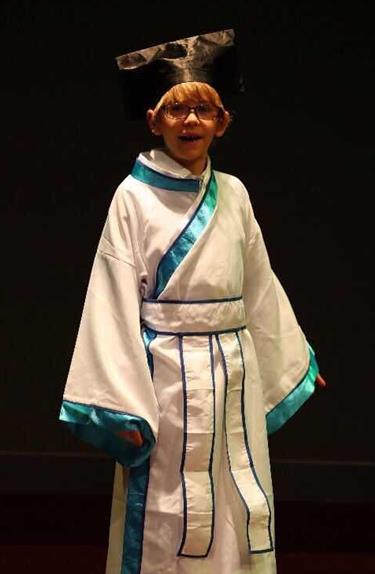American boy wins plaudits for Chinese interpretation
Augie Dobson is an American boy who is proud of his ability to speak Chinese — justly so it turns out.
The 9-year-old from Shanghai Community International School has been studying the language for three years. “My Chinese is of intermediate level,” he said.
Augie is one of a group of three whose play about an ancient Chinese poem stood out in a drama performance competition held among local international schools to encourage overseas students to understand Chinese culture.
Their play, based on Tang Dynasty (618-907) poet He Zhizhang’s “Hui Xiang Ou Shu,” was awarded the second prize at yesterday’s ceremony.
“Hui Xiang Ou Shu,” which means writing something after returning home, describes an old man who left his hometown at a young age but feels like a stranger when he returns a couple of years later.
“It’s a sad story of an old man’s life,” Augie said. “It sounds like he left Shanghai 50 years ago and now he returns. Shanghai has changed a lot over the period.”
Sun Qingjiang, who teaches Chinese in school, said she tries to lace the poem with melody and teaches her pupils to sing and dance to the poem. “Children are interested in singing poems rather than just reciting them.”
Also, she uses a modern interpretation, which she said makes for a better understanding.
“Our play is kind of time travel, in which today’s people meet ancient people. So, children can directly feel the vicissitudes,” she said.
Students at Shanghai Community International School now learn an ancient Chinese poem every day. “It’s difficult but I’m trying to remember,” said Augie.
The first prize went to drama “Kong Cheng Ji,” performed by students at Dulwich College Shanghai.
"Kong Cheng Ji," or "Empty Fort Strategy," tells of Zhuge Liang, a politician and strategist who lived during the Three Kingdoms period (220-280). He had no army to defend the city but managed to make the enemy’s leader Sima Yi believe that the city was full of traps and ambushes. As a result, Sima retreated.
Li Zihao, 9, whose father is a Hong Kong resident, plays Sima in the drama. Li is a fan of chengyu, Chinese four-character idioms.
“I’ve downloaded an app about telling stories with chengyu, and he loves it. I think chengyu is a very simple essence of Chinese culture,” said his mother. “Also, I’m very surprised to find that the school has its own Chinese textbook to teach children about Chinese culture.”
Also awarded, among others, at yesterday’s ceremony was Fudan International School’s drama between Juliet and a Chinese Romeo called Liang Shanbo.
The education authority said the awarded dramas will be staged at local international schools.

Augie Dobson, one of the stars in a drama performance competition, performs in a play about an ancient Chinese poem.

Foreign students residing in Shanghai take a bow after performing at the Shanghai Great World yesterday.
















